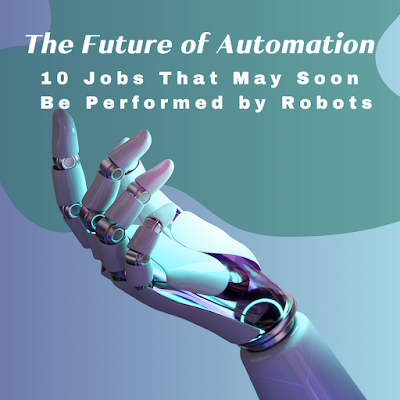The Future of Automation: 10 Jobs That May Soon Be Performed by Robots
Robots taking over jobs is a complex issue with both advantages and disadvantages. While robots can increase productivity and save businesses money, they can also lead to higher unemployment and a decrease in wages. To address these challenges, it is important to find ways for robots and humans to work together in the workplace, and to invest in training programs that help workers develop the skills they need to adapt to technological change.
By taking a proactive and collaborative approach, we can ensure that robots and humans can coexist in the workplace, and that we can reap the benefits of technological innovation while minimizing its negative impact.
As technology continues to advance, there are many jobs that could potentially be taken over by robots in the future. While this list is by no means exhaustive, here are some examples of jobs that could be automated in the years to come:
Manufacturing jobs: Robots are already used extensively in manufacturing, and this trend is likely to continue. Robots can perform tasks such as assembly, welding, and painting more quickly and accurately than humans.
Transportation jobs: Self-driving cars and trucks are already being developed and tested, and it is likely that these vehicles will eventually replace human drivers. This could include jobs such as taxi and truck drivers.
Customer service jobs: Chatbots and other automated systems are already being used to handle customer service inquiries. As these systems become more advanced, they could potentially replace human customer service representatives.
Data entry jobs: Many companies already use software to automate data entry tasks, but this trend is likely to continue as the technology becomes more advanced.
Construction jobs: Robots are already being used in construction for tasks such as bricklaying and demolition. As the technology advances, it is possible that robots could take on more complex tasks in construction.
Agriculture jobs: Robots are already being used in agriculture for tasks such as planting and harvesting. As the technology advances, robots could potentially take on more tasks in farming and agriculture.
Cleaning jobs: Robots are already being used for tasks such as vacuuming and floor cleaning, and it is likely that they could take on more cleaning tasks in the future.
Security jobs: Robots are already being used for tasks such as monitoring and surveillance, and it is possible that they could take on more security-related tasks in the future.
Medical jobs: Robots are already being used in medicine for tasks such as surgery and diagnostics. As the technology advances, robots could potentially take on more tasks in healthcare.
Education jobs: While it may be harder to imagine robots taking over jobs in education, it is possible that they could be used for tasks such as grading papers or providing tutoring services.
Overall, it is important to remember that while robots may take over some jobs, they will also create new jobs and industries. It is important for individuals and businesses to adapt to these changes and to find ways to work alongside robots in the workplace.
